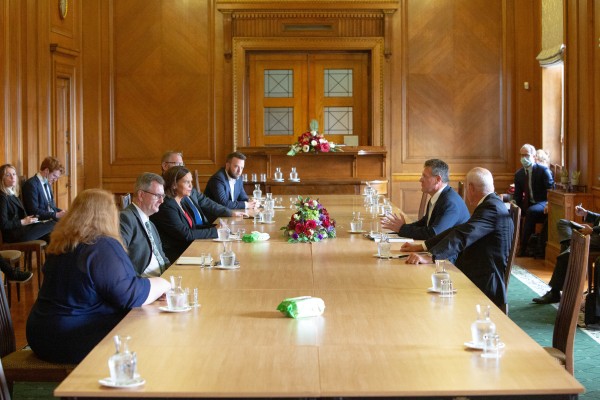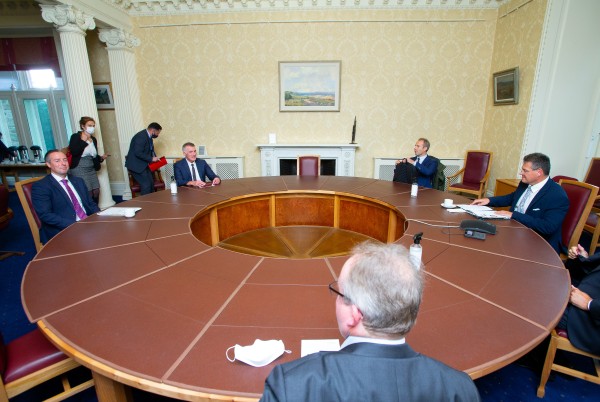Brexit & Beyond Newsletter
13 September 2021
Welcome to the 13 September 2021 Brexit & Beyond newsletter
Welcome back! We hope you are suitably refreshed after the summer – we can expect the coming weeks and months to be busy ones for Brexit. Recess is over at the NI Assembly; last week Maroš Šefčovič visited Northern Ireland and met with politicians, civil society, and businesses. The DUP announced that “within weeks” it would pull out of the Executive if its ministers have to implement the Protocol on Ireland/Northern Ireland in its current form. This morning plenary resumed, and Ministers at the Executive Office and Department of Agriculture, Environment and Rural Affairs will take questions from MLAs today and tomorrow - we can expect them to be asked about recent Brexit developments. The Finance Committee will hear from the Road Haulage Association and the Ulster Farmers’ Union on Thursday.
Šefčovič visits Northern Ireland
European Commission Vice-President Maroš Šefčovič came to Northern Ireland on Thursday for a two-day visit. He met the Speaker of the NI Assembly, party leaders, First Minister Paul Givan, and junior Minister Declan Kearney. He also met with business leaders and civil society, including the Special EU Programmes Body which oversees the PEACE programmes, and the NI Equality Commission and NI Human Rights Commission.

Šefčovič (second right) meeting with party leaders from Alliance, the DUP, Sinn Féin, the UUP and the SDLP | Source: European Union
Following his engagements, Šefčovič gave a speech at Queen’s University. He sought to emphasise what he regards as the opportunities the Protocol presents, saying his conversations in Northern Ireland “have only strengthened [his] conviction that enormous benefit can be extracted from its unparalleled access to two of the world's largest markets.” He said he looks forward to upcoming investment conferences and said enquiries about investing have come from the US, Canada and the EU, adding “if we are to turn this opportunity into reality, the Protocol must be properly implemented.”
He stressed that making the Protocol work is a shared responsibility and said he and his colleagues “have been going through our [EU] rules with a fine tooth comb to respond to outstanding problems with creative and solid new solutions.” He acknowledged unionist concerns, saying, “We are seeking solutions that work for all, including those opposed to the Protocol. Because no matter what your outlook is, we are all in this for the long-run.”
He said the focus should be on “those issues that matter the most to the people of Northern Ireland”, such as medicines, and not on requests to remove the role of the European Court of Justice which would “effectively mean cutting Northern Ireland off from the EU’s single market”. He said he would be leaving NI “encouraged” that solutions can be found to make the Protocol work well.
Later on Friday, Šefčovič held a press conference where he said that he didn’t hear anyone dwelling on the role of the ECJ, or suggesting NI should not be in the EU Single Market cost-free. He said he had had open discussions with political leaders from all parties, and there is a common goal to achieve the best possible result for the people of Northern Ireland.
On sanitary and phytosanitary matters (SPS) Šefčovič said the EU is ready to explore all the flexibilities within the Protocol and said it would rebuild trust to have real-time access to data on GB-NI trade as promised.
The lack of role for Northern Ireland’s representatives in the governance of the Protocol has been highlighted by commentators, as well as those who met with Šefčovič last week. Šefčovič addressed this, saying there was a desire from business and civil society to proceed with more structured cooperation. He stated there should be better involvement of NI representatives from business, and the political sphere or institutions in discussions with the EU around legislative proposals and policy-making within the Protocol’s remit. He said this would be discussed with the UK. He noted the opportunity for the NI Executive to engage in the Joint Consultative Working Group. European Parliament members are eager to establish the EU-UK Parliamentary Assembly, he said, and there is a possibility of a specific arrangement with NI.
Reactions from political parties
DUP
Earlier on Thursday, the DUP leader Sir Jeffrey Donaldson laid out the DUP's stance on the Protocol. He said the party will withdraw from North-South structures (except on health matters), and will block additional checks at NI ports. Donaldson stated, “if the choice is ultimately between remaining in office or implementing the protocol in its present form, then the only option for any unionist Minister would be to cease to hold such office.”
Sinn Féin
Sinn Féin leader Mary Lou McDonald said solutions to the Protocol issues could be found in the Joint Committee. Junior Minister in the Executive Office Declan Kearney welcomed the commitment of Maroš Šefčovič to resolving outstanding issues, and his support for an inter-parliamentary group between the European Parliament and the NI Assembly. He said that Šefčovič has invited NI business organisations to submit proposals to the EU on “how trade and business can be conducted more smoothly on an East/West basis.”

First Minister Paul Givan (DUP) and junior Minister Declan Kearney (Sinn Féin) meeting with Šefčovič | Source: European Union
UUP
Ulster Unionist Party leader Doug Beattie said his party takes a different approach in its opposition to the Protocol and will engage constructively. He says that the UK Government’s Command Paper “provides a potential pathway out of the Protocol mess and unionism should be using its influence within the democratic structures to hold the Government to account for delivering on it.” Earlier in the week the UUP published a paper on alternatives to the current Protocol. It states that medicines should be removed from the Protocol, and proposes an SPS arrangement and a ‘cross-border compliance body Treaty’ with the Republic of Ireland to manage cross-border trade.
Alliance
Alliance leader Naomi Long said the meeting with Šefčovič was "constructive and candid". She advocated for a veterinary agreement, saying, “combined with better data sharing, it has the potential to be a game changer”. She also raised the need for legal certainty around medicines, and the democratic deficit. Long (who was an MEP in 2019) said, “with no MEPs we can't influence new EU legislation but my former EU colleagues are open to a consultative forum so Executive Ministers can input into that process. That would avoid new problems being created down the line.”
SDLP
Colum Eastwood, leader of the SDLP told RTÉ that Šefčovič’s visit was “very significant” and he wanted to talk about creating jobs and opportunities. The SDLP has previously called for a strategy to “maximise the investment and broader economic potential offered by the dual market access” under the Protocol.
Grace periods extended indefinitely
On 6 September Lord Frost laid a Written Ministerial Statement announcing that the UK Government “will continue to operate the Protocol on the current basis.” This means that the current grace periods (for supermarkets and their suppliers, pet travel, medicines and import of chilled meat products) will continue to apply. He said there has been initial technical talks between the UK and EU.
The European Commission released a statement to “take note of” the UK’s statement, emphasising it will not renegotiate the Protocol. The Commission is not currently proceeding with the infringement procedure launched in March, following the UK’s unilateral extension of grace periods.
Lord Frost’s speech
Lord Frost gave a speech at the British-Irish Association on 4 September where he reinforced his views on the Protocol on Ireland/Northern Ireland as set out in the July Command paper: “The difficulties come from the way the Protocol is constructed, not just the way it is being implemented.” He says the UK’s approach is “workable and manageable…It may challenge accepted ways of doing things in customs or goods standards. But I haven’t heard anyone say it can’t work in principle.” He stated their preference to use Article 13.8 of the Protocol to replace parts of the existing text.
The UK Government’s Command Paper calls for the removal of the European Court of Justice’s role in enforcing the Protocol, a ‘standstill’ arrangement to maintain the operation of the Protocol on the current basis, removal of medicines from the scope of the Protocol, and proposes that full checks apply only on goods moving onto Ireland and the EU single market from Northern Ireland.
Analysis

Maroš Šefčovič with QUB Vice Chancellor Ian Greer, and Professors Katy Hayward and David Phinnemore, who presented their Post-Brexit Governance NI project | Source: European Union
Professors Katy Hayward and David Phinnemore have recommended actions for hearing the views of Northern Ireland on the Protocol and improving its acceptance. These include: accessible and up-to-date information, greater transparency of UK-EU bodies, formalised consultation with business and civic society, formalised appearances at the NI Assembly’s Committee for the Executive Office, a ‘decision-shaping’ role for NI officials or experts in discussions on EU law applying under the Protocol, and a consultation role for the NI Assembly, Executive and intergovernmental bodies. Hayward and Phinnemore argue that “a significant shortcoming of the governance arrangements for the protocol is the absence of formal interaction between the Joint Committee which takes decisions on the protocol and the MLAs who, with their democratic consent in 2024, hold much of the protocol’s continued application in their hands.” Read about the 2024 consent vote here.
The Institute for Government says the UK and EU should work to get hard data about how the Protocol is working on the ground, rather than anecdotal evidence. It also says that the UK and EU “must first agree on what options are (and are not) on the table, and then establish common ground”.
Common Frameworks
Last Monday (6 September) the Lords Common Frameworks Scrutiny Committee heard from Mick Antoniw, Welsh Counsel General and Minister for the Constitution. Common Frameworks are being developed in policy areas which were previously governed by EU law and which intersect with devolved competence. He said the biggest obstacle in making progress on Common Frameworks is the work on cross-cutting issues, which include the Protocol on Ireland/Northern Ireland, the Internal Market Act, and international agreements. Antoniw said cooperation among the UK, Welsh, Scottish Parliament and NI Assembly has been positive over the past nine months and it would be a mistake to prioritise a timeline over proper quality and scrutiny of the frameworks.
Other news
- The UK Government has confirmed it will invest more than £730 million in the new PEACE PLUS programme for Northern Ireland. This makes a total budget of almost £1 billion, which is the biggest PEACE programme yet. The programme supports peace and reconciliation work and cross-border development.
- The Commons International Trade Committee is accepting written submissions to its inquiry into the UK-EU trading relationship. The terms of reference can be found here.
This Week at the Assembly
- Monday 13 September, 2pm – Plenary - Question Time – The Executive Office
- Tuesday 14 September, 2pm – Plenary - Question Time – Agriculture, Environment and Rural Affairs
- Wednesday 15 September, 2.10PM - Committee for Finance - Oral Evidence on the Northern Ireland Protocol: Road Haulage Association (RHA); Ulster Farmers’ Union
- Wednesday 15 September, 3.10PM - Committee on Procedures - Section 6A Consent Decisions
- Thursday 16 September, 2PM – Committee for Justice -EU Exit secondary legislation



